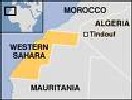Morocco believes it has the diplomatic clout to settle Africa´s oldest territorial dispute on its terms, confident it can rely on the goodwill it has earned overseas for its pro-democracy reforms at home. But the kingdom has no easy task in pursuing its plan to grant autonomy to Western Sahara, a mineral-rich land it annexed in 1975 and where Rabat´s control is contested by independence movement Polisario. (29-MAR-07)
Written by Lamine Ghanmi and first released today by Reuters, this article reached www.humanrightshouse.org via the electronic alerts of the Norwegian Support Committee for Western Sahara. It has been edited for republication here by HRHF / Niels Jacob Harbitz.
Efforts to find a solution have been stalled for years. Rabat´s vision of autonomy is opposed by Polisario´s main backer Algeria and key sympathiser South Africa, who say it would bury the prospect of independence for the former Spanish colony.
Overwhelming diplomatic support needed, but unlikely to be had
Morocco senses the time is right for a push for its autonomy idea at the United Nations, heartened by sympathy it has won overseas for efforts to end rights abuses and deepen democracy at home since King Mohammed ascended the throne in 1999. Morocco will have quiet support from ally and diplomatic power France when it unveils a new autonomy blueprint for Western Sahara at the U.N Security Council next month. However, the international goodwill Morocco has won for its domestic reforms is unlikely to translate into the overwhelming diplomatic support it would need to win approval for the new plan at the United Nations, analysts and diplomats say.
Low-intensity guerrilla war
“Morocco has a sympathetic image, but international relations are not built only on sympathy for democracy,” said a European diplomat who spoke on condition of anonymity, noting Algeria wielded influence due to exports of oil and gas. For Morocco to win enough support to break the diplomatic deadlock, its reforms at home would have to be bolder — maybe to the extent that the royalist elite that has ruled the kingdom for centuries cedes much of its control, the analysts said. Moreover, on a practical level, autonomy would not work without a reform of that elite, an instinctively centralising and sometimes authoritarian establishment known as the Makhzen. “Morocco as it is now is not ready for autonomy according to international standards,” said a political analyst and editor of the main Arabic-language daily Al Massa Taoufik Bouachrine. “Autonomy supposes a change in state structure. Now the core of that state is the Makhzen, with its authoritarian aspects.”
-Autonomy (not independence). And that´s my last offer
All agree a resolution is long overdue. Morocco, claiming centuries-old rights over the territory rich in phosphates, fisheries and possibly offshore oil, annexed the former Spanish colony in 1975. That triggered a low-level guerrilla war with Algeria-backed Polisario, which seeks an independent state. A U.N. ceasefire agreement in 1991 promised Sahrawis a referendum to decide the fate of the territory. The vote never happened and Rabat now says autonomy is the most it will offer. Rabat insists its plan — as yet unpublished — is steeped in democratic values and investor-friendly liberal economics. But for the plan to work, it would require changes at home. Political scientist El Manar Esslimi Abderrahim said expanding democracy was the best way to make the plan a practical reality.
-The whole world community will take notice of Rabat´s goodwill
Analysts expect the constitution to be revised to enshrine a shift of power to more representative local government from the Makhzen, a network of traditional and modern royalists including wealthy landowners, businessmen and tribal leaders. “The autonomy plan would not be accepted as a solution if it is not linked to a change of the state structures that would transform Morocco from a Makhzen state to a federal and democratic state,” said political scientist Naimi Mustapha. “Morocco has a good plan. Algeria will reject it and the whole world community will take notice of Rabat´s goodwill to resolve the conflict and will later cut aid to Polisario,” said ex-human rights minister Mohamed Ziane.
Africa´s last colony
But Polisario has ample support in Africa, where many countries tend to see Western Sahara as the continent´s last colony. An estimated 158,800 Sahrawi refugees are living in camps in the Algerian desert where malnutrition is widespread. “The proposal is a new mechanism to win time to perpetuate the fait accompli and prolong the conflict,” Mohamed el Moutaoikil, a leading Polisario sympathiser, told Reuters in Casablanca where he lives. King Mohammed´s envoys have visited Europe, Africa, Asia and the Americas to brief leaders on the main points of the plan. Few details have been leaked. Official sources said the main points are a free election in Western Sahara for a parliament which would appoint a local government to run the territory´s affairs while Rabat keeps control over defence and diplomacy.





